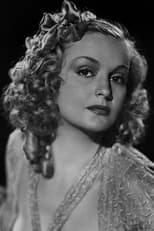Camilla Horn
Acted in
Los 5 Faust de F. W. Murnau
2002
as Herself / Gretchen (archive footage)
Wenn ich sonntags in mein Kino geh'...
1992
as Self
Spiders
1989
Schloß Königswald
1988
as Fürstin Großmutter
Der Unsichtbare
1987
as Olga Benjamin
The Black Forest Clinic
1985
as Dr. Rens′ Mutter
Unheimliche Geschichten
1982
Frankies Braut
1982
as Frau von Kieblitz
Bavarian Film Award
1979
as Self
Immer bei Vollmond
1970
as Wegelin's Mother
He's at It Again
1970
as Paula
Gestern gelesen
1969
as Frau von Marwitz
Appointment in Beirut
1968
as Evelyn Brown
Dreizehn Briefe
1967
as Frau Neumann
Die Erbin
1958
as Elizabeth Almond
Vati macht Dummheiten
1953
as Baronin von Baran
Königin der Arena
1952
as Diana Bianca, Dompteuse
Deutscher Filmpreis
1951
as Self
Gesucht wird Majora
1949
as Gritt Faller
Intimitäten
1948
as Helene
Seine beste Rolle
1944
as Elise Sander
Broken Love
1942
as Corinna Dellys, l'amante di Alberto
Friedemann Bach
1941
as Mariella Fiorini
Die keusche Geliebte
1940
as Renée Lemonier
Die letzte Runde
1940
as Lilly
Herz ohne Heimat
1940
as Dina Horster
Polterabend
1940
as Lissi
Zentrale Rio
1939
as Diane Mercier
Roman eines Arztes
1939
as Käthe Üding - seine Frau
In geheimer Mission
1938
as Marion
Fahrendes Volk
1938
as Pepita, Kunstreiterin
Rote Orchideen
1938
as Gräfin Ogolenska
Crooks in Tails
1937
as Vera Dalmatoff
Sein letztes Modell
1937
as Maria Várady
White Slaves
1937
as Manja - seine Tochter
The Red Rider
1935
as Hasia Nowrowska
Ich sehne mich nach dir
1934
as Ivonne Brandt
Der letzte Walzer
1934
as Vera
A Waltz for You
1934
as Fürstin Stefanie
The Luck of a Sailor
1934
as Louise
Die große Chance
1934
as Helga
Der Doppelgänger
1934
as Jenny Miller
If I Were King
1934
as Inge Winkler
Racoczy-Marsch
1933
as Vilma
Money Governs the World
1933
as Lilly
Matinee Idol
1933
as Sonia Vance
The Love Nest
1933
as Fifi
Moral und Liebe
1933
as Vera
The Return of Raffles
1932
as Elga
The Cheeky Devil
1932
as Alice Ménard
The Five Accursed Gentlemen
1932
as Camilla
The Night Without Pause
1931
as Letta Larbo
Frivolous youth
1931
I Go Out and You Stay Here
1931
as Gaby
The Song of the Nations
1931
Sunday of Life
1931
as Ellen Hobart
Hans in Every Street
1930
as Elisabeth, the Bride
The Great Passion
1930
as Eva von Loe
Morals at Midnight
1930
as Nelly Wendt
Fundvogel
1930
as Andrea
Mein Herz gehört Dir...
1930
as Diane D'Artois
Die Königsloge
1929
as Alice Doren
Three Around Edith
1929
as Lady Edith Trent
Eternal Love
1929
as Ciglia
Tempest
1928
as Princess Tamara
Der fröhliche Weinberg
1927
as Clärchen Gunderloch
Eva and the Grasshopper
1927
as Camille de Saxe
The Bordellos of Algiers
1927
as Adrienne Brisson
Madame Wants No Children
1926
Faust
1926
as Gretchen Marguerite
Tartuffe
1926
as (uncredited)
Ways to Strength and Beauty
1925



















































